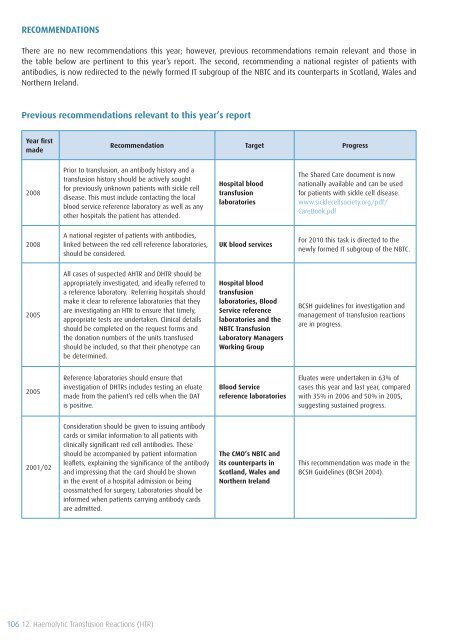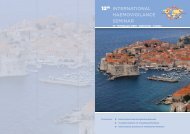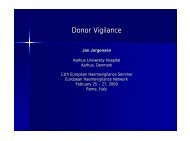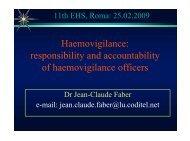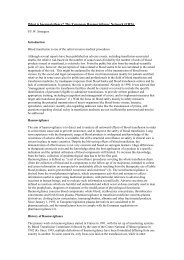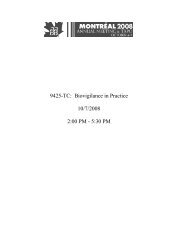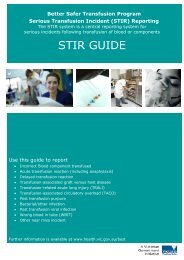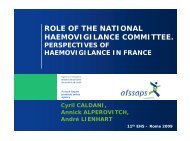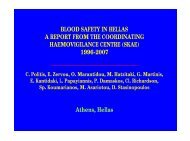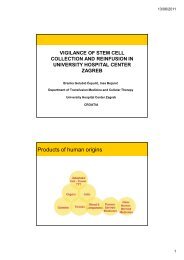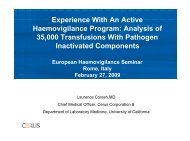SHOT Annual Report 2009 - Serious Hazards of Transfusion
SHOT Annual Report 2009 - Serious Hazards of Transfusion
SHOT Annual Report 2009 - Serious Hazards of Transfusion
Create successful ePaper yourself
Turn your PDF publications into a flip-book with our unique Google optimized e-Paper software.
RECOMMENDATIONS<br />
There are no new recommendations this year; however, previous recommendations remain relevant and those in<br />
the table below are pertinent to this year’s report. The second, recommending a national register <strong>of</strong> patients with<br />
antibodies, is now redirected to the newly formed IT subgroup <strong>of</strong> the NBTC and its counterparts in Scotland, Wales and<br />
Northern Ireland.<br />
Previous recommendations relevant to this year’s report<br />
Year first<br />
made<br />
Recommendation Target Progress<br />
2008<br />
Prior to transfusion, an antibody history and a<br />
transfusion history should be actively sought<br />
for previously unknown patients with sickle cell<br />
disease. This must include contacting the local<br />
blood service reference laboratory as well as any<br />
other hospitals the patient has attended.<br />
Hospital blood<br />
transfusion<br />
laboratories<br />
The Shared Care document is now<br />
nationally available and can be used<br />
for patients with sickle cell disease.<br />
www.sicklecellsociety.org/pdf/<br />
CareBook.pdf<br />
2008<br />
A national register <strong>of</strong> patients with antibodies,<br />
linked between the red cell reference laboratories,<br />
should be considered.<br />
UK blood services<br />
For 2010 this task is directed to the<br />
newly formed IT subgroup <strong>of</strong> the NBTC.<br />
2005<br />
All cases <strong>of</strong> suspected AHTR and DHTR should be<br />
appropriately investigated, and ideally referred to<br />
a reference laboratory. Referring hospitals should<br />
make it clear to reference laboratories that they<br />
are investigating an HTR to ensure that timely,<br />
appropriate tests are undertaken. Clinical details<br />
should be completed on the request forms and<br />
the donation numbers <strong>of</strong> the units transfused<br />
should be included, so that their phenotype can<br />
be determined.<br />
Hospital blood<br />
transfusion<br />
laboratories, Blood<br />
Service reference<br />
laboratories and the<br />
NBTC <strong>Transfusion</strong><br />
Laboratory Managers<br />
Working Group<br />
BCSH guidelines for investigation and<br />
management <strong>of</strong> transfusion reactions<br />
are in progress.<br />
2005<br />
Reference laboratories should ensure that<br />
investigation <strong>of</strong> DHTRs includes testing an eluate<br />
made from the patient’s red cells when the DAT<br />
is positive.<br />
Blood Service<br />
reference laboratories<br />
Eluates were undertaken in 63% <strong>of</strong><br />
cases this year and last year, compared<br />
with 35% in 2006 and 50% in 2005,<br />
suggesting sustained progress.<br />
2001/02<br />
Consideration should be given to issuing antibody<br />
cards or similar information to all patients with<br />
clinically significant red cell antibodies. These<br />
should be accompanied by patient information<br />
leaflets, explaining the significance <strong>of</strong> the antibody<br />
and impressing that the card should be shown<br />
in the event <strong>of</strong> a hospital admission or being<br />
crossmatched for surgery. Laboratories should be<br />
informed when patients carrying antibody cards<br />
are admitted.<br />
The CMO’s NBTC and<br />
its counterparts in<br />
Scotland, Wales and<br />
Northern Ireland<br />
This recommendation was made in the<br />
BCSH Guidelines (BCSH 2004).<br />
106 12. Haemolytic <strong>Transfusion</strong> Reactions (HTR)


